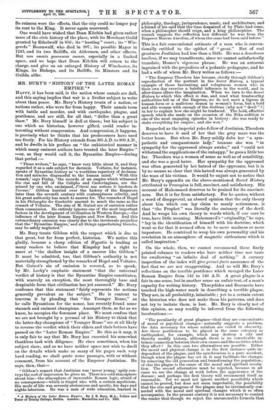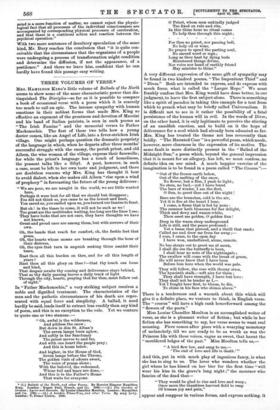MR. BURY'S "HISTORY OF THE LATER ROMAN EMPIRE."* HAPPY, it
has been said, is the nation whose annals are dull, and this saying implies that war is a livelier subject to write about than peace. Mr. Bury's History treats of a nation, or nations rather, who were far from happy. Their annals teem with battle and murder, and with earthquake, plague, and pestilence, and are still, for all that, "duller than a great thaw." Mr. Bury himself is dull at times; but his subject is one which no historian, however gifted, could render in- teresting without compression. And compression, it happens, is precisely what he thinks that his predecessors have used too freely. For his History extends from 395 A.D. to 800 A.D., and he dwells in his preface on "the unhistorical manner in which many eminent authors have treated the later Empire" —or, as they would call it, the Byzantine Empire—during that period :—
" These writers," he says, "knew very little about it, and they regarded it as a safe subject for derision. Voltaire, for instance, speaks of Byzantine history as a worthless repertory of declama- tion and miracles disgraceful to the human mind." With this remark,' says Finlay, the records of an empire which witnessed the rise and fall of the Caliphs and Carlovingians, are dis- missed by one who exclaimed, roterai aux nations le bandeau de l'erreur: Gibbon hurried over the history of the Emperors later than the seventh century with contemptuous celerity, and his great authority has much to answer for. The remarks of Hegel in his Philosophic der Geschichte amount to much the same as the remark of Voltaire. The sins of M. Guizot are of omission rather than commission. He entirely ignores one of the most important factors in the development of civilisation in Western Europe,—the influence of the later Boman Empire and New Rome. And this extraordinary omission was clearly due to the inveterate prejudice that the Byzantine Empire,' and all things appertaining thereto, may be safely neglected.'
Mr. Bury treats Gibbon with the respect which is due to that great, but far from perfect, historian. We notice this gladly, because a cheap edition of Hypatia is leading so
many readers to believe that Kingsley had a right to sneer at "the shallow insight of a sneerer like Gibbon."
It must be admitted, too, that Gibbon's authority is not materially strengthened by the remarks of Hegel and Voltaire. But Guizot's sin of omission is covered, so to speak, by Mr. Lecky's emphatic statement "that the universal verdict of history is that the Byzantine Empire constitutes, with scarcely an exception, the most thoroughly base and despicable form that civilisation has yet assumed." Mr. Bury confesses that this statement "fairly represents the notions generally prevalent on the subject." He is content to traverse it by pleading that "the Younger Rome," as he calls Byzantium for the nonce, has recently found some staunch and eminent champions. Amongst them, so far as we know, he occupies the foremost place. We must confess that we are not brought by a perusal of his History to think that the latter-day champions of "Younger Rome "are at all likely to reverse the verdict which their elders and their betters have passed on the "Later Roman Empire." Be this as it may, it is only fair to say that Mr. Bury has executed his somewhat thankless task with diligence. He rises sometimes, when his subject rises ; and as we have neither apace nor wish to dwell on the details which make so many of his pages such very hard reading, we shall quote some passages, with or without comment, from his account of the Emperor Justinian. He says, then, that— "Gibbon's remark that Justinian was never young,' aptly con- veys the sort of impression he gives us. There is a cold atmosphere about him—the atmosphere of inexorable Roman logic, afraid of no consequences—which is tinged also with a certain mysticism. His mode of life was severely abstemious and ascetic, his days and nights laborious. He was a man of wide education, learned in • 4 History of the Later Boman Empire. By J. B. Bury, M.A., Fellow and Tutor of Trinity College, Dublin. London: Macmillan and Co. 1889. philosophy, theology, jurisprudence, music, and architecture, and a friend of his said that the time despaired of by Plato had come, when a philosopher should reign, and a king philosophise. The remark suggests the reflection how different he was from the Emperor Marcus Aurelius, of whom the same had been said before."
This is a fair conventional estimate of a man who is conven- tionally entitled to the epithet of "great." But of real greatness Justinian had less than a little. He was a denwboros basileus, if we may transliterate, since we cannot satisfactorily translate, Homer's vigorous phrase. He was an autocrat ingrained with the prejudices of a pedantic pedagogue, and he had a wife of whom Mr. Bury writes as follows :—
" The Empress Theodora has become, chiefly through Gibbon's reproduction of the portrait in the Secret History, a typical example of those fascinating and voluptuous women who in their own day exercise a baleful influence in the world, and in after-times allure the imagination. When we turn to the Secret History to which this effect is due, and read what trustworthy authorities tell us of the Empress, we do not meet a tigress in human form or a malicious demon in woman's form, but a bold and able woman with enough of the diablesse [why not " devil " P] in her to explain how she might be traduced. The bold, effective speech which she made on the occasion of the Nika sedition is one of the most engaging episodes in history : she was ready to stake everything for empire; and she won."
Regarded as the imperial yoke-fellow of Justinian, Theodora deserves to have it said of her that the grey mare was the better horse. But when Mr. Bury mildly dubs her "a sym- pathetic and compassionate lady," because she was "in sympathy for the oppressed always awake," and "could not withstand the supplications of the unhappy," he goes a little too far. Theodora was a woman of sense as well as of sensibility, and she was a good hater. Her sympathy for the oppressed was often generated by her hatred of the oppressor, but it is by no means so clear that this hatred was always generated by the woes of his victims. It would be unjust not to notice that Mr. Bury's appendix on the above-mentioned Secret History attributed to Procopius is full, succinct, and satisfactory. His account of Mahommed deserves to be praised for its succinct- ness. But it is far from satisfactory. For he quotes, without a word of disapproval, an absurd opinion that the only theory about him which can lay claim to manly seriousness, is that "the Prophet" was literally the emissary of the devil.
And he wraps his own theory in words which, if our ears be true, have little meaning. Mahommed's "originality," he says, "lay in the identification of himself with his doctrine, which went so far that it seemed often to be mere madness or mere imposture. He contrived to wrap his own personality and his revelation in an atmosphere of magnetic enthusiasm which is called inspiration."
On the whole, then, we cannot recommend these finely printed volumes to readers who have neither time nor taste for swallowing "an infinite deal of nothing." A cursory inspection of the index will give primd-facie assurance of the fact that we are not exaggerating. And so will Mr. Bury's reflections on the terrible pestilence which ravaged the Later Roman Empire from 542 to 546 A.D. A great plague is a fair in one sense, but in another sense an unfair test, of a man's capacity for writing history. Thucydides and Boccaccio have touched the high-water mark in describing a terrible plague. They are, in all probability, inimitable ; yet to a certain extent the historian who does not make them his patterns, and does not try to imitate them, is lost. Mr. Bury is clearly not of this opinion, as may readily be inferred from the following lucubrations
:- "The peculiarity of great plagues—that they are concomitants of moral or psychical changes—naturally suggests a problem, the data necessary for whose solution are veiled in obscurity. Are these pestilences to be placed in the same category as earthquakes, for example, which may destroy a city and thereby modify history, although there is no conceivable in- trinsic connection between their own causes and the societies which they affect ? In this case two alternatives are possible. Either the moral and physical change is in the first instance quite in- dependent of the plague, and the synchronism is a pure accident, though when the plague has set in it may facilitate the changes by removing the old generation and transforming the population ; or else the plague is the cause of the moral and spiritual revolu- tion. The second alternative must be rejected, because in all cases we see the change at work before the appearance of the disease ; and perhaps the first theory will recommend itself as reasonable. Yet we must not ignore another possibility which cannot be proved, but does not seem improbable, the possibility that the rise and progress of the plague may be intrinsically con- nected with the moral and spiritual changes which it so often accompanies. In the present century it is not necessary to remind the reader that though we reject the unreasonable formula that
mind is a mere function of matter, we cannot reject the physio- logical fact that all processes of the individual consciousness are accompanied by corresponding physical processes of cerebration, and that there is a continual action and reaction between the psychical operation."
With two more sentences of desultory speculation of the same kind, Mr. Bury reaches the conclusion that "it is quite con- ceivable that the circumstance that the organisms of a people were undergoing a process of transformation might condition and determine the diffusion, if not the appearance, of a pestilence." And there we leave him, confident that he can hardly have found this passage easy writing.



















































 Previous page
Previous page